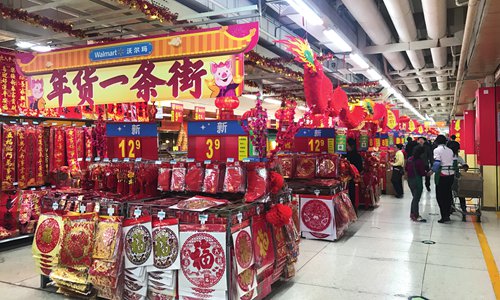Spring Festival shopping moves online amid epidemic control

Beijing: Spring Festival shopping, a time-honored tradition for the Chinese New Year, has taken a virtual twist, as more Chinese people, having chosen to stay put during the upcoming holiday due to COVID-19 concerns, are going online to buy gifts for their family and friends.
In an effort to contain the latest resurgence of COVID-19, many places across China have encouraged residents and migrant workers to stay where they are to celebrate the Spring Festival, which falls on Feb. 12 this year.
In response to the call, many people have cancelled their travel plans for the Spring Festival, the most important festival in China and one traditionally marked by mass migration and family reunions.
However, while family reunions seem out of the question for these people, they are making efforts to ensure their gifts, together with their best wishes, are delivered to the doorsteps of their loved ones.
Li Jie, an employee of a Beijing-based company, has decided to spend the holiday in the national capital instead of returning to his hometown in the southwestern Sichuan Province. He has bought food and other gifts online for his parents, who will celebrate the festival more than 1,500 km away.
“It’s the first time that I’m spending the festival away from my family. I want to express my best wishes through the gifts,” Li, 27, said.
A novice in the kitchen, he has also bought himself half-cooked foods from online platforms in preparation for dinner on Spring Festival Eve.
China’s leading e-commerce platforms, including Taobao, JD.com, and Pinduoduo, have launched a series of promotional events in the run-up to the Spring Festival, kick-starting an online shopping spree.
JD.com has reported booming sales in beverages, vegetables and fruits since Jan. 1, more than double the number in the same period last year, according to data from the JD Big Data Research Institute.
JD.com has also seen a surging number of orders placed in one city but sent to another city. In particular, the number of such orders placed by the people in the northeastern city of Dalian has soared by 219 percent year on year.
Chinese Internet search giant Baidu said in a recent report that the most searched buzzwords in the days leading up to the festival were “Spring Festival shopping gala” and “what to buy for parents ahead of Spring Festival.”
“Now that I can’t go back home and visit my family and friends in person, the choice of Spring Festival gifts becomes very important,” said Fang Xue, who has decided to stay in Beijing, cancelling plans to return to her hometown in the northwestern Shaanxi Province.
Fang, 26, bought a cleaning robot online for her parents. “Spring Festival is an occasion when you buy things that your parents would normally think are too expensive,” she said. “My parents used to say they can do just fine without the robot. Now they are crazy about the little gadget that saves them time and effort.”
According to the JD Big Data Research Institute, home appliances, mobile phones, computers, foods, beverages and health-and-wellness products are among the most popular goods on JD.com in recent days.
Specialty products from across China, such as Sichuan’s hotpot seasoning, pu’er tea from Yunnan Province, and porcelain from Jiangxi Province, have also seen booming sales on the platform.
Young people are getting creative with selecting Spring Festival gifts for their parents. For the post-1990’s generation, smart speakers, cleaning robots, massage chairs, and foot massagers have joined mobile phones and skincare products among the most popular choices for parents, according to the Baidu report.
China’s e-commerce platforms have ramped up efforts to ensure supplies and meet the rising demand.
Zeng Chen, vice-president of JD.com, said the platform will keep its logistics service in regular operation in nearly 300 cities in 30 provincial-level regions across the country during the Spring Festival holiday.
The company has tripled its stock of fresh foods compared to the same period last year, said Zeng.
Fresh-food chain Freshippo has been selling specialty foods from across China in its online and offline stores since early January, including Sichuan-style marinated steak and eight-treasure glutinous rice from Jiangsu Province.
“Our customers can enjoy the flavors of their hometowns without going back home,” said Chen Meijun, from Freshippo’s Beijing branch.





